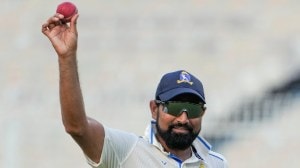No troops to Iraq, no strings to Pak
External Affairs Minister K Natwar Singh today sought to put a personal stamp on the country8217;s foreign policy by indicating that India ...

External Affairs Minister K Natwar Singh today sought to put a personal stamp on the country8217;s foreign policy by indicating that India would not send troops to Iraq and that a solution to the Palestine imbroglio without Arafat was unrealistic. Singh also placed a high premium on relations with the Islamic world and granted a carte blanche to Pakistan to discuss 8216;8216;whatever it wants8217;8217;, be it Kashmir, nuclear issues or even terrorism.
At his maiden press conference after the regime change in New Delhi, Singh announced that nuclear talks with Pakistan would be held from June 19-20, to be followed a week later by a dialogue at the Foreign Secretary-level from June 27-28.
Spread across an hour, the Foreign Minister8217;s remarks were peppered with phrases that hadn8217;t been heard in New Delhi for the last five years, and which many had thought had been buried along with the Cold War. As Singh admitted, he was from a different era and had returned to a different Foreign Office after 15 years.
To begin with, he drew a clear line between the non-aligned movement and 8216;8216;non-alignment8217;8217;, pointing out that the former needed renovation because the world in which it played an important role no longer exists. There is a new agenda now, which revolved around AIDS, hunger, poverty alleviation, etc, he added.
Singh also hinted at a brand new policy measure: a common nuclear doctrine between India, Pakistan and China.
But when a journalist asked him to spell out his thoughts on the proposal, Singh indicated that it was still at a nascent, philosophical stage.
That apart, the Minister announced that he would be participating at the Asian Cooperation Dialogue in Qingdao, Chine, from June 21-22. But before that, Singh would travel to Oman and the UAE on June 10, because 8216;8216;we attach the greatest importance to the Islamic world.8217;8217;
AskEd about sending troops to Iraq, Singh said: 8216;8216;If Spain and Honduras and withdrawing their troops8230;8217;8217;
Asked whether there was any change in India8217;s policy on Israel, Singh pointed out that it was the Narasimha Rao government which established full diplomatic relations with Israel in 1992. He added that New Delhi valued its relations with Isreal, 8216;8216;but not at the expense of sacrificing the legitimate rights and aspirations of the Palestinian people.8217;8217;
Clarifying his position on the Israel-Palestine issue, Singh said, 8216;8216;What we are saying is that what is happening in the Palestinian territories is unacceptable.8217;8217; He pointed out that even Washington had criticised the stalling of the roadmap by the Sharon government.
In fact, Singh spent a large part of the conference defending his views on Pakistan since he took over. He reiterated that the Shimla agreement was the bedrock of the bilateral relationship, though the new government would abide by all agreements signed since.
Singh insisted that the dialogue process with Pakistan would continue and New Delhi was determined to discuss 8216;8216;whatever they want.8217;8217;
- 01
- 02
- 03
- 04
- 05






























